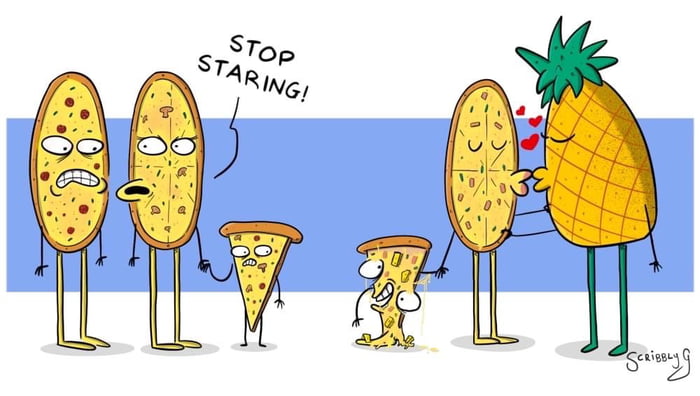
At the time of writing, there is a horrible debate raging in the Cardano community. It has split friends apart and the rift might soon become unsalvageable. The damage is worse than when we discussed whether Cardano should burn ADA, or even in regards to the single pool vs multipool debate.
I am of course talking about whether pineapples belong on pizza.
I know some of my readers might be too horrified to continue, I understand. But for the handful of you remaining, we shall be investigating this further.
Why exactly is Cardano obsessed with pineapple on pizza, and what can this teach us about our investments in ADA?
Fresh out of the Oven
Contrary to what the name might imply, Hawaiian pizza was actually invented in Canada. Not only that but it was invented in 1962 by Sam Panopoulos, a Greek immigrant inspired by his experience preparing Chinese dishes which commonly mix sweet and savoury flavours.
From a cooking standpoint, Hawaiian pizza is basically a strange mishmash of different culinary traditions, which contrary to all possible expectations works quite well with each other. Of course, if you were to ask the internet on the matter, the answer would be quite different.
Over the last decade and change, it’s become sort of a running in-joke on the web to treat pizza as the most horrible substance on the planet. This is such a pervasive narrative that the vocal supporters of pineapple on pizza are few and far between.
Curiously though, if you actually dive into the numbers, the results are flipped. When you ask people in private whether they like Hawaiian pizza, a slight majority will reply in the affirmative.
This is hardly new in regards to opinion polls – whether it’s something as controversial as voting for Brexit, or Trump, or going against the status quo narrative, people will say one thing but support quite another in private – pollsters even have a term for it: “preference falsification.”
Preference falsification tends to happen when there is a vociferous minority that gets a disproportionate amount of the airtime, and the silent majority comes to believe their own views are taboo to hold. As such, they stay quiet as a means to preserve their social standing, while ordering pineapple on pizza in the privacy of their own homes.

So what does this have to do with Cardano?
Much like pineapple on pizza, it’s become a bit of a meme to hate on Cardano, and for similar reasons as well: it stands out.
If you were to put L1 blockchains up in a lineup, Cardano is the one that would stand out. Off the top of my head, there’s the goofy/eccentric founder, obsession with peer review, being slow to market, aversion to VC funding, etc.
Unless you’ve been living under a crypto rock, chances are that you might have noticed that Cardano attracts a lot of hate. Despite being a working product that has delivered on all of its promises (though admittedly at a leisurely pace), there’s a large portion of the crypto community which still writes it off as a scam.
None of its peers receives such criticism, even when their capacities are comparable or lesser.
This is strange, as it should have elements that critics would like. Cardano has ideas from Bitcoin, others from Ethereum, and a little sprinkling of academic work and early attempts of Proof of Stake projects. Then, it takes these principles and pushes them further than they had ever been explored.
As such, while you can trace individual bits and pieces to specific inspirations, taken as a whole, it’s an entirely different animal.
Going back to Hawaiian pizza, it’s interesting to note that it is not the most hated topping out there. According to a 2019 YouGov poll that asked Americans about their preferred pizza toppings, anchovies and eggplants have the dubious honour of being the most hated ones.
Pineapple pizza is not only far from the worst pizza topping, but it’s also among the most popular. It’s a viable contender for the top spot, but its jazzy approach to doing things causes friction with more traditional pizza lovers.
In much the same way, Cardano is a threat as it marks a clean break from competitors and starts creating its own genre. At times, Charles Hoskinson, the founder of Cardano, has joked that he’s sad that Cardano gets lumped together with all the other crypto projects, as its focus is vastly different.
Hence we can see the motive for the disproportionate amount of hate. Cardano represents a viable alternative to the status quo. While it may not make a radical difference whether you invest in Terra or Solana, investing in Cardano marks a radically divergent philosophical approach.
And let’s remember some people in crypto are in a hostage situation. After all, individuals who invested in Ethereum and staked their coins in expectation for ETH 2.0 are locked in the protocol for Satoshi knows how many years to go.
So it makes perfect sense to attack anything that changes the game and could potentially threaten your investments. While, on the other hand, the silent majority decides not to rock the boat.
However, as Cardano grows by the hundreds in active largescale projects on the chain, by the millions in wallet addresses and by the billions in Total Value Locked, these tired critiques ring increasingly hollow.
The wider public is gaining sophistication when dealing in crypto and is becoming braver in trying more exotic flavours that they might encounter. In time, they might even be able to loudly and publicly proclaim their preferences, and realize that they’re far from alone in supporting Cardano.
Conclusion
People don’t spend their time fighting something that isn’t a threat to their position. We must remember that the opposite of hate is not love, but ambivalence.
When someone truly doesn’t care about you, that’s when you’re emotionally dead to them. Hate you can deal with, you can redirect it and channel the energy into something productive for yourself.
So, it’s a good thing that Cardano is able to elicit such powerful emotions in people, it very much means we’re in the game to be the top dog.
Cardano shares many commonalities with pineapple pizza; as its glaring differences separate it from the rest of the crowd and make it a target for vitriol.
Yet despite this, there’s a growing majority that has come to quietly respect it and enjoy it, away from prying eyes. WAGMI!
____
If you’re in the crypto or in the traditional finance industry looking for someone to ghostwrite content for you, please do not hesitate to message me. I’m a full-time ghostwriter.
Join the community over at @flantoshi on Twitter.
And if you would like to support this project and help me pay rent, I’ll pass on the tip hat and you can send ADA to:
- ADA wallet address: addr1qxfgs44d763uuw4hy6qatx383v9mmrrm6qazay6eren9sp5r2usruecwv33lp2t2nqp4ss6hrc9ac8yd2klxnsfnxz2qw3su4s
- Adahandle – $flantoshi
Thank you for your support!









